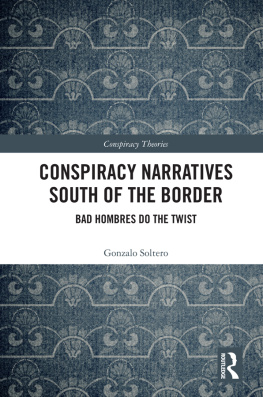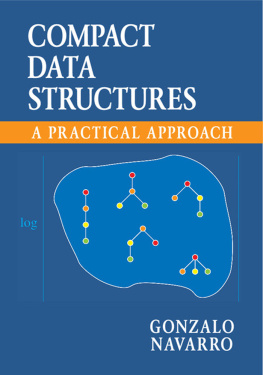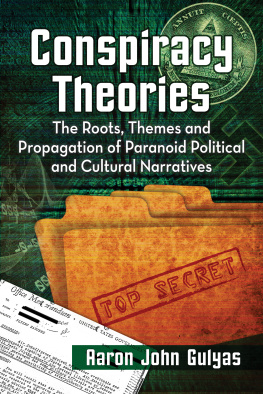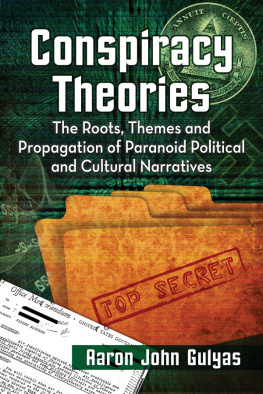Conspiracy Narratives South of the Border
This book examines four conspiracy narratives from Mexico that push the boundaries of conspiracy research in a new direction. They include narratives about Lee Harvey Oswalds visit to Mexico City, shortly before he apparently assassinated JFK, street gangs across borders and how some of our worst fears are projected onto them.
Mexico is a fertile terrain for conspiracy theories due to its complex social environment and its proximity to the United States, which not only made it a strategic platform during the Cold War but also todays land of bad hombres that according to Donald Trump should be fended off with a wall. Conspiracy theories are always narrative in nature, telling us about the state of the world and the actors behind such conditions. This narrativity tends to be so enthralling that they have increasingly become the substance of entertainment and even politics. This volume analyses Mexican conspiracy narratives and explains how they produce meaning in a variety of social and political contexts.
This book will be of interest to researchers of conspiracy theories, crime and its representations, Mexican politics and society and USLatin American relations.
Gonzalo Soltero is an author and professor at the National Autonomous University of Mexico (UNAM) in Len, Guanajuato.
Conspiracy Theories
Series Editors:
Peter Knight
University of Manchester
Michael Butter
University of Tbingen
Conspiracy theories have a long history and exist in all modern societies. However, their visibility and significance are increasing today. Conspiracy theories can no longer be simply dismissed as the product of a pathological mind-set located on the political margins.
This series provides a nuanced and scholarly approach to this most contentious of subjects. It draws on a range of disciplinary perspectives including political science, sociology, history, media and cultural studies, area studies and behavioural sciences. Issues covered include the psychology of conspiracy theories, changes in conspiratorial thinking over time, the role of the Internet, regional and political variations and the social and political impact of conspiracy theories.
The series will include edited collections, single-authored monographs and short-form books.
Routledge Handbook of Conspiracy Theories
Edited by Michael Butter and Peter Knight
Contemporary Conspiracy Culture
Truth and Knowledge in an Era of Epistemic Instability
Jaron Harambam
Strategic Conspiracy Narratives
A Semiotic Approach
Mari-Liis Madisson and Andreas Ventsel
Conspiracy Narratives South of the Border
Bad Hombres Do the Twist
Gonzalo Soltero
Conspiracy Theories in Eastern Europe
Tropes and Trends
Edited by Anastasiya Astapova, Onoriu Colcel, Corneliu Pintilescu and Tams Scheibner
Conspiracy Narratives South of the Border
Bad Hombres Do the Twist
Gonzalo Soltero
First published 2021
by Routledge
2 Park Square, Milton Park, Abingdon, Oxon OX14 4RN
and by Routledge
52 Vanderbilt Avenue, New York, NY 10017
Routledge is an imprint of the Taylor & Francis Group, an informa business
2021 Gonzalo Soltero
The right of Gonzalo Soltero to be identified as author of this work has been asserted by him in accordance with sections 77 and 78 of the Copyright, Designs and Patents Act 1988.
All rights reserved. No part of this book may be reprinted or reproduced or utilised in any form or by any electronic, mechanical, or other means, now known or hereafter invented, including photocopying and recording, or in any information storage or retrieval system, without permission in writing from the publishers.
Trademark notice: Product or corporate names may be trademarks or registered trademarks, and are used only for identification and explanation without intent to infringe.
British Library Cataloguing-in-Publication Data
A catalogue record for this book is available from the British Library
Library of Congress Cataloging-in-Publication Data
Names: Soltero, Gonzalo, 1973 author.
Title: Conspiracy narratives from south of the border : bad hombres do the twist / Gonzalo Soltero.
Description: Abingdon, Oxon ; New York, NY : Routledge, 2021. | Series: Conspiracy theories | Includes bibliographical references and index.
Identifiers: LCCN 2020022291 (print) | LCCN 2020022292 (ebook) | ISBN 9780367470425 (hardback) | ISBN 9781003033028 (ebook)
Subjects: LCSH: Conspiracy theoriesMexico. | Narrative inquiry (Research method) | MexicoIn popular culture. | MexicoSocial conditions. | MexicoForeign relationsUnited States. | United StatesForeign relationsMexico.
Classification: LCC HV6275 .M48 2021 (print) | LCC HV6275 (ebook) | DDC 001.9dc23
LC record available at https://lccn.loc.gov/2020022291
LC ebook record available at https://lccn.loc.gov/2020022292
ISBN: 978-0-367-47042-5(hbk)
ISBN: 978-1-003-03302-8(ebk)
Typeset in Times New Roman
by Apex CoVantage, LLC
To Claudia Chibici-Revneanu,
who has taught me so much and still laughs at my jokes.
This work was made possible through financial and institutional support from the National Autonomous University of Mexico via the UNAM-DGAPA-PASPA programme during a sabbatical year. It also largely benefited from a Newton Advanced Fellowship of the British Academy (Grant NAFR1180233).
The photographs of Elena Garro, her daughter Helena Paz, a CIA informant and a yet-to-be Nobel laureate Gabriel Garca Mrquez, dancing at a party in the house of Carlos Fuentes in September 1965, were taken by Hctor Garca, and their copyright belongs to the Fundacin Mara y Hctor Garca, who authorised their inclusion in this volume. The use of archive material from the DFS and other police sources is granted as public information issued officially through Mexican transparency law.
Earlier versions of some parts of , for Crime Urban Legends in Mexico: A Case Study of Authorless Narratives That Contribute to Implicit Cultural Policy, in International Journal of Cultural Policy 22 (2), 2016, 18199, and Indiana University Press for The Mexican Transmission of Lights Out! in Journal of Folklore Research 53 (3), 2016, 11534.
Part of what appears in was originally written for my chapter Same Urban Legends, Different Bad Hombres: The Risk of Narratives across Borders about Deviant Others in a book with Stockholm University Press (provisionally titled Narratives Crossing Borders, forthcoming), where I retain copyright under a Creative Commons 4.0 license.
Although writing is a lonely pursuit, many people have contributed to this volume. I would like to especially thank some of them. Chris Bilton knew this book when it was little and has accompanied it ever since. Peter Knight warmly welcomed it when I proposed the idea by email without discarding it as the ruminations of yet another conspiracy theorist. Mara Isabel Loza Vaqueiro was extremely proficient in helping me deal with archives in Mexico City and indexing and referencing the manuscript, no small feat as its sources are legion and speak in tongues.







